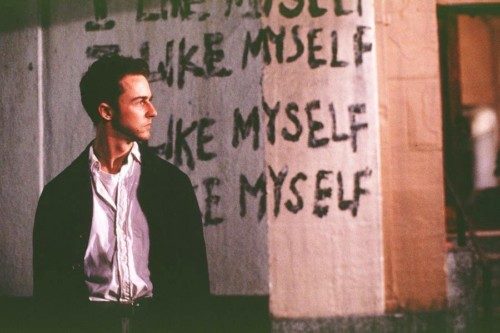The 1999 film Fight Club was highly prophetic for those too young to identify with the Baby Boomers and too old to identify with the Millennials: those of us who vaguely, apathetically, identify with being called Generation X. Speaking to us in the midst of a quarter-life crisis, Tyler Durden told us what we already suspected, but dreaded being forced to accept: we are the middle children of history, no purpose, no place.
It’s true. We stand for nothing. Nothing unites us, apart from this cynicism. We have no Great War – Afghanistan and Iraq will never define our generation like Vietnam did the one before us and World War II the one before that. Very few of us fought in it, and the body count incurred simply does not compare.
Neither do we have a Great Depression.
The proportion of Baby Boomers raised in absolute poverty dwarfs the proportion of Generation X raised in absolute poverty, as the several decades of technological advancements and massive industrial and economic expansion after World War II all but eliminated childhood poverty by the 1970s, save for the unfortunates born to mentally or physically ill parents.
Where the Baby Boomers used the political system as a weapon to enslave the coming generations and to keep them working to maintain Boomer leisure and privilege, Generation X mostly refused to engage.
And where the Millennials are taking measures to overthrow the current political and economic systems and to replace them something not borne of the poverty mentality of the Boomers, again Generation X mostly refuses to engage.
In this sense, Generation X is a generation of springtime, in that we comprise the part of the sine wave where yin transforms to yang, and life begins to blossom but without direction, owing to its inexperience.
But in the same way that the springtime is a season of broken weather, so too is Generation X naturally unstable, and so too will we break apart.

The natural division at our heart is like this: half of us are like the Boomers, half are like the Millennials.
It might be that the Boomers end up representing the “old left” in the exact same way that they once represented the “new left” against the “old right” of the Greatest Generation, with the Silent Generation playing the role of autumn.
This suggests that half of Generation X will sell out and throw their lot in with their parents, resisting change and acting to perpetuate the same injustices on the Millennials that the Boomers imposed on them.
In this way, half of us will become the “old left”. Probably this means that, as we age and become the leaders of industry alongside the Boomers, we will advocate for more governmental control and regulation, fewer entrepreneurial freedoms and the continued importation of millions of third-world people to destroy the solidarity and so also the wages of those we employ, screaming “racism” every time a Millennial or Generation Z complains about anything.
The other half of us will become the “new right”. Probably this means that, as the Millennials also age and gain in economic and political influence, they will still look primarily to members of Generation X for immediate guidance, and those of us willing and able to fill these roles will naturally do so.
It’s very possible both that the Millennials and Generation Z, having been raised in an abundance mentality that sharply contrasts with the poverty mentality of the Boomers and their immediate predecessors, will demand a radical transformation of society and revaluation of values, and that they will look to members of Generation X for moral, philosophical and spiritual guidance.
This column predicts that half of us will succeed in reciprocating these expectations from the next generations, whereas the other half will cling to the old ways out of fear and fail.
The next generations might well be horrified at the sexual permissiveness, the suicidally reckless obsession with alcohol, the negligent attitude to the potential negative consequences of mass immigration, the indifference to the mental damage of exposure to suggestive television advertising and the brutally cognitively restrictive education system that all combine to characterise the culture that we have become used to – after all, none of these phenomena are caused by the expression of universal or eternal moral truths.
Will we stand aside for the next generation, or will we try and strangle it in the crib in order to shore up our own positions? That is the essential question that will divide Generation X over the coming decades.
